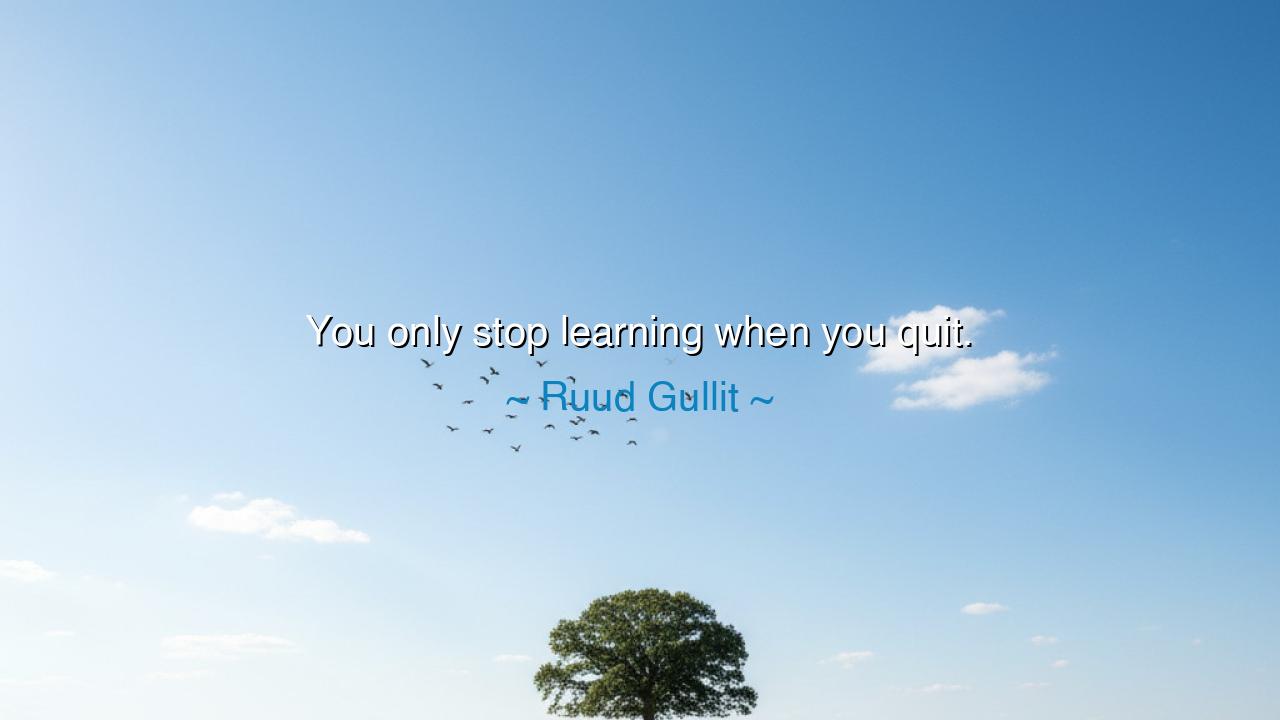
You only stop learning when you quit.






There are words that shine with the light of perseverance — words that remind us that growth is not bound by age, nor by circumstance, but only by the will to continue. Ruud Gullit, the great Dutch footballer and leader on the field, once said: “You only stop learning when you quit.” Simple in form, yet profound in truth, this statement captures the eternal rhythm of progress — that the journey of learning and becoming ends not with failure, but with surrender. For as long as a man strives, he remains a student of life; but the moment he yields to despair, he closes the door to his own evolution.
The meaning of Gullit’s words reaches far beyond the field of sport. It speaks to every human endeavor — to art, to work, to love, to the very act of living. Life itself is the greatest teacher, and every experience, whether triumphant or painful, carries a lesson. Learning is not confined to the classroom nor to youth; it is a flame that burns as long as we feed it with curiosity and resilience. To “quit” in Gullit’s sense is not merely to cease activity — it is to stop believing that one can still improve, still rise, still transform. It is the death of the learner’s spirit, the extinguishing of the inner fire that drives all creation.
The origin of this wisdom lies in the heart of all mastery. Gullit himself was not merely an athlete of talent, but of vision. He understood that greatness in sport — as in life — comes not from brilliance alone, but from the constant pursuit of refinement. Even at the height of his fame, he remained a student of the game, studying, adapting, and improving. His words echo the timeless philosophy of the ancients: that the true sage is not the one who knows all things, but the one who knows he will never stop learning. In this way, Gullit stands alongside thinkers like Socrates, who confessed, “I know that I know nothing,” and Confucius, who said, “Real knowledge is to know the extent of one’s ignorance.”
To understand the power of this truth, one need only look to the life of Thomas Edison, the inventor who failed more than a thousand times in his quest to perfect the lightbulb. When asked about his repeated setbacks, Edison replied, “I have not failed. I’ve just found 10,000 ways that won’t work.” His learning never stopped because he never quit. Every failure was a lesson, every obstacle a teacher. The difference between those who achieve greatness and those who fade into mediocrity is not intelligence or talent — it is the refusal to stop learning, the will to rise again after every fall.
There is also a spiritual depth in Gullit’s teaching. To keep learning is to remain alive in the deepest sense. When the heart grows stagnant, when curiosity dies, the soul begins to decay long before the body does. The one who continues to seek wisdom — who asks questions, explores, experiments — stays young forever, no matter his years. The ancients believed that wisdom is the motion of the soul; to stop learning is to still that motion, to wither before one’s time. Therefore, to live fully is to be an eternal student, walking the unending path of discovery.
The lesson in Gullit’s words is clear and powerful: failure is not the end — quitting is. The road of mastery is paved with frustration, fatigue, and moments of doubt, yet each step forward, however small, is sacred. One may pause, one may rest, but one must not abandon the journey. For every setback, there is a hidden teaching; for every mistake, a seed of wisdom waiting to bloom. The mind that stays open to learning can transform even defeat into growth.
Let this truth be carried like a torch by all who walk the path of purpose: do not quit, for in quitting lies the death of learning, and in learning lies the breath of life. Each day offers a lesson, each failure a teacher, each trial a chance to grow. Be as the craftsman who perfects his art through endless shaping, or the athlete who trains though weary, or the thinker who questions even in doubt. For as long as you are learning, you are still alive, and as long as you refuse to quit, life itself will continue to teach you its deepest secrets. Thus, as Ruud Gullit said, remember — you only stop learning when you quit, and the wise never quit, for they know that the journey itself is the destination.






AAdministratorAdministrator
Welcome, honored guests. Please leave a comment, we will respond soon